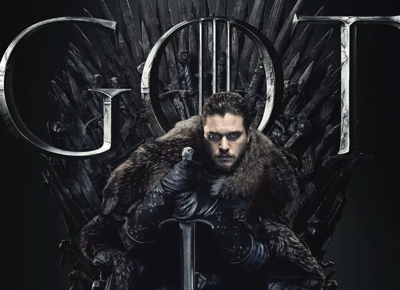At last, the premium cable channel has started to show the final season of its most popular show. But now the problems for HBO may begin. Center director Jeffrey Cole explores HBO’s dilemma.
______________________________
By Jeffrey Cole
HBO did everything perfectly. It built Game of Thrones into the most popular television program in the world. It broke the final season in half to build excitement and to raise expectations. Many viewers complained that they could not possibly wait another year to see the conclusion of George R.R. Martin’s epic series.
For HBO that’s a good problem for viewers to have.
 Everything went according to plan. The last season is expected to break television and internet records and to lead to one of the most powerful and successful finales of all time. The momentum keeps building, and the audience is primed. HBO is ready to reap the rewards.
Everything went according to plan. The last season is expected to break television and internet records and to lead to one of the most powerful and successful finales of all time. The momentum keeps building, and the audience is primed. HBO is ready to reap the rewards.
There is just one problem: HBO doesn’t really want you to watch the final seven episodes of Game of Thrones (GoT). They would prefer to build hype and excitement for the next few years and continue to make it the most talked about television event in at least a decade.
To actually show you the final episodes (as they began doing on April 14) means that just six weeks later all the hype, excitement, anticipation, and viewers would be gone. The buildup has been great for HBO. The actual last episode will mean the end of all of that.
They brilliantly prolonged the dreaded moment of the last scene of the last episode.
The seventh and eighth seasons each had seven episodes, bringing the total of the two seasons to 14. That’s just a little bit (two or three episodes) more than most high-profile cable or streaming seasons run in a single season. Breaking a final season in half to continue the hype and the anticipation has been done before (Mad Men and Breaking Bad, among others).
If HBO could have had their way without a mutiny from the fans, they would have shown one episode a year for the next seven years.
Fans had to wait more than a year between the end of Season Seven and beginning of Season Eight. The next to last season ended on August 27, 2017. The first new episode of the final season premiered on April 14, 2019. That’s a wait of 595 days, closer to two years.
______________________________________________________________________________________________
HBO has always been afraid that when their most successful programming ends, there will be a lull and some people may give up their subscriptions. That is one of the reasons that HBO never emulated Netflix by allowing subscribers to binge their series. If HBO subscribers plan to give up their subscriptions, then they will have to wait through all seven episodes over seven weeks to do so.
_______________________________________________________________________________________________
HBO gambled that fans would not forget the context or (always complicated) storylines of Game of Thrones. Perhaps they even allowed that the long interval would give old fans and especially new viewers time to review old episodes or to catch up. The gamble paid off. Viewers did not lose interest: the long delay increased interest. While we have seen delays before, we have never seen one this long.
Expect HBO’s method to become a new staple of high-profile television.
The cable and streaming network must have calculated how long the premiere of the final season could be stretched. They knew they had a massive ratings juggernaut and cultural phenomenon on their hands and wanted to savor it as long as they could.
The precursor to HBO’s Game of Thrones method
Along with Breaking Bad, probably the most anticipated series end in the last 20 years was for The Sopranos.
In the final episode of The Sopranos on June 10, 2007, Tony and his family were sitting together in a restaurant. Journey’s “Don’t Stop Believing” played on the soundtrack, building anticipation about whether a hit man would break in to kill Tony or whether Tony would go on to fight another day. In the middle of the song, the scene suddenly cut to black, leaving the viewers to decide in their own minds what happened to Tony.
Cable companies reported that many viewers believed their service had gone out.
Many critics thought that series producer and creator David Chase had crafted a brilliant ending. I share that view. But many others were disappointed that the final episode did not resolve whether Tony would pay for his crimes.
Perhaps memories of viewer unhappiness with the final episode of The Sopranos caused HBO to worry that–no matter what they did with Game of Thrones–some viewers would be disappointed. That’s another reason to hold off the series finale as long as possible.
HBO made a massive investment in Game of Thrones. It became one of the (if not the) most expensive television shows of all time with a budget that rivaled that of theatrical films. In the middle seasons, when GoT had become an international sensation, budgets for a season could run more than $100 million. Only Netflix’s The Crown and one or two other television shows have ever had budgets like that.
Variety reports that the budget for each episode of the final Game of Thrones season will run $15 million.
With so much at stake and with so much momentum, it’s no wonder HBO wanted the GoT phenomenon to last as long as possible.
Cancellation fears
Along with the fear of disappointment at the ending was another more important fear: what would the end of the most popular television show in the world do to HBO subscriptions?
HBO has always been afraid that when their most successful programming ends, there will be a lull and some people may give up their subscriptions. That is one of the reasons that HBO never emulated Netflix by allowing subscribers to binge their series. If HBO subscribers plan to give up their subscriptions, then they will have to wait through all seven episodes over seven weeks to do so.
This isn’t an unreasonable fear: by its second season on HBO, The Sopranos had become a hit and must-see television. When the third season was about to premiere, as many as two million homes added a subscription.
Thirteen weeks later, when the season ended, as many as 80% canceled their HBO.
Netflix is well aware of this problem, especially because its subscribers binge. They know that someone can subscribe for a month, watch the programs they want to see, and then cancel. This is why Netflix produces so much programming: there is never a lull or a logical point when viewers can end their subscriptions.
Unlike Netflix, HBO doesn’t produce $12 billion a year of original programming (it’s about $2.5 billion). There are a number of lulls throughout the year. This is one of the reasons Bill Maher and John Oliver are so important to HBO. Even with occasional breaks, they produce a constant output of timely programming.
The end of Game of Thrones presents a bigger than usual opportunity for viewers to rethink their HBO memberships.
As the final episodes premiere, all around the world we will see an interesting display of how television has changed. GoT is streamed in much of the world and in the U.S. on HBO GO and NOW as well as shown on cable.
A streaming show is not on a schedule (except for when it premieres) and can be seen anytime convenient to the viewer. That is true of most streaming. But GoT will be seen as if it were live. Fans will rush to not have even a one-minute delay. For the past four years, every time a new GoT episode premieres it “breaks” the internet.
Of course, nobody can break the internet: the phrase simply means that so many people are watching at the same time that some other people can’t get a connection.
______________________________________________________________________________________________
By its second season on HBO, The Sopranos had become a hit and must-see television. When the third season was about to premiere, as many as two million homes added a subscription. Thirteen weeks later, when the season ended, as many as 80% canceled their HBO.
_______________________________________________________________________________________________
Even though they can watch whenever they want, people watch Game of Thrones immediately because they have a genuine fear that other people will reveal the plot twists and surprises on social media. This is the new world of television: things that do not have to be viewed live because of technology are viewed “live” because of the fear of spoilers.
This is water cooler television from the 1970s and 1980s times 10.
Many people will watch the final seven episodes of Game of Thrones, perhaps not having watched the earlier episodes and without context, because it is the television event of the season (or more).
Everything about GoT spells success for HBO.
HBO just wishes they could continue building anticipation instead of actually showing you the final moments of the series.
____________

Jeffrey Cole is the founder and director of The Center for the Digital Future at USC Annenberg.
See all columns from the center.
April 24, 2019

